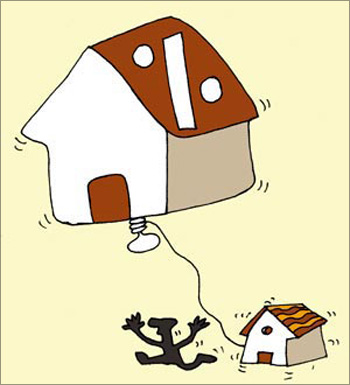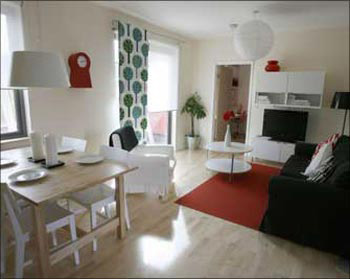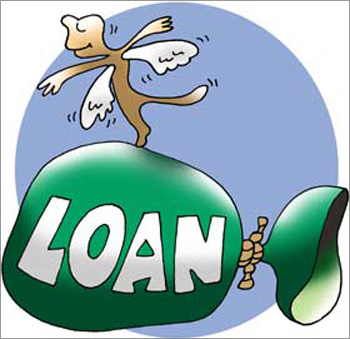
The year gone by was a better year for the residential property market compared to the one before it. However, 2009 had its share of surprises.
Having started on a very sombre note, it moved on to the fast lane between April and June. "This period saw one of the best sales in the residential property market in the past two-and-a-half years," says Pankaj Kapoor, founder and CEO, Liases Foras, a Mumbai-based real estate research firm.
Since then, sales have come down as homebuyers opted to pull out due to sudden increase in prices. "Sales are expected to be down in the first quarter of the new calendar year as well," says Kapoor.
Further, with inflation moving up, interest rates on home loans are also expected to be jacked up in 2010. Against this backdrop, what should you expect in the coming year if you have still not bought a house for yourself? More importantly, once you arrive at the 'buy' decision, what should you keep in mind while striking a deal? Click NEXT to read further. . .

The Year Gone By
The manner in which the residential property market moved in 2009 has thrown up important themes and lessons that will hold water in 2010.
Affordable Housing
In 2009, units offered by developers, on the affordable housing plank, at attractive price points (housing under Rs 40 lakh, or Rs 4 million) generated interest among buyers.
"Developers finally recognised the fact that the real demand was in this segment and that it makes sense to concentrate here," says Aditya Verma, VP & business head, Makaan.com, a property portal.
Choosy homebuyers
In 2009, homebuyers were very choosy while striking a deal. "Homebuyers preferred to buy from reputed developers. In most cases, they stayed away from tier-III and tier-IV developers," says Vikas Chimakurthy, director, Kotak Realty Funds Group.
Also, due to the large number of projects launched in 2009 and the inventory that had piled up over the years, homebuyers were spoilt for choice. While they took their time to strike deals, their inclination was towards projects that were nearing completion.
Unity of homebuyers
The year also saw dissatisfied homebuyers unite against the might of the developers.
"Buyers formed groups on the Internet to discuss their problems," says Verma. In fact, the Internet is becoming a medium to voice one's grievances and is a repository for someone who is planning to buy a house in the new year. Click NEXT to read further. . .

Crystal Ball Gazing
So, what should you expect in the coming year? To a great extent, 2009 has set the trend for things to come in 2010.
Attractive price points
The trend of launching houses on the affordable housing plank will gain further strength in 2010.
"You will see lot of projects where developers will do away with some of the frills associated with luxury housing and price the unit at a level that is affordable to the target group," says Jai Mavani, executive director and head-infrastructure, KPMG India.
Says Pranay Vakil, chairman, Knight Frank India: "The push for affordable housing is undoubtedly the most significant silver lining of the realty slump, and this concept is expected to remain in focus in 2010 as well."
There is, however, an angle to this. "Within the major cities, there is limited space and land is available only at a premium. Hence, affordable houses will continue to be launched on the outskirts or periphery of cities. But there is pent-up demand for such offerings and they will see moderate growth," says Sudhir K. Nair, head, Crisil Research.
Price movements
Units launched on the affordable housing plank in 2009 saw capital values go up by around 15 per cent. There were also instances of developers launching luxury housing in 2009. So, which way would prices move in 2010?
"I do not see prices going up quickly in the short term," says Anshuman Magazine, chairman and managing director, CB Richard Ellis, South Asia.
"The recent price increases that we have seen are not sustainable. We will mostly see a flat market and if there are surprises in store, then we can see a decline as well," says Mavani. Pankaj Kapoor of Liases Foras, on the other hand, expects prices to correct in 2010.
"Prices have to undergo further correction of around 20-25 per cent in 2010. With buyers moving away from the market, the inventory is piling up. The sheer weight of this will reduce the cost," he says. Click NEXT to read further. . .

What You Should Do
With enough supply already there and prices expected to remain largely stable, it makes 2010 a good year to buy a house of your own, if you have not bought your first house till now.
Should you buy now? One factor that could possibly throw a spanner in the works is the rising interest rate. However, when interest rates kept moving up during 2004-2007, people still bought houses.
"So, it is the confidence of the buyer, his confidence in the economy, economic growth and his income levels that decide the interest in housing," says Amit Bhagat, CEO and managing partner, ASK Property Investment Advisors.
Now that the economy is slowly coming back on the rails, one should buy a house if it's within budget.
The Guide Map
There are some important lessons that have emerged from the past that you can keep in mind.
Do not over-leverage
Once you over-leverage yourself, regularly servicing the loan can become a problem. So, if you are planning to fund your home purchase through a loan, ensure that your EMI is not more than 40 per cent of your net take-home pay.
Stick with reputed developers
In most cases, they have the capability to finish their project on time. Stick with developers who are listed on the stock exchange. "These developers have higher compliance and transparency standards compared to unlisted ones," says Verma.
Do not rush
The house you buy is the biggest investment that you will make in your life. So, do not rush into the process. "There is merit in taking out time and consulting real estate professionals, home finance companies, like-minded friends and members of the family before arriving at a decision," says Verma. Click NEXT to read further. . .

Due Dilgence Parameters
There are some tried-and-tested parameters that you should stick to during the home-buying exercise. First, get a pre-approval letter from a lender.
"One place where this helps is with the builder," says Harsh Roongta, CEO, ApnaPaisa, a loan advisory firm. The builder knows that at least funds amounting to the loan amount agreed in principle are guaranteed.
Identify the property
The best way to look for a property is to seek the help of the lending institution. Most big lending institutions have a ready-made list of properties with them. They include properties in the list after carrying on the necessary due diligence.
So, you gain in many ways if you choose a property from this list. The loan approval process will be faster and you will be saved from doing the due-diligence yourself. While choosing the property, also check if the project is FDI-funded. Such projects are usually completed on schedule.
Further, choose a ready-to-move-in property over a property that is under construction. Says Roongta: "Never finalise a lender till you finalise the property. You should finalise your property before spending any money on getting the loan approved."
Choosing the builder
Stick with builders listed on the stock exchange. "These builders are more accountable and transparent due to disclosure norms mandated by Sebi," says Verma. If the builder is not listed, then there are a few things that you should do.
"Check the projects the developer launched in the past two years. If those projects are getting delayed a lot, it is a cause for concern," says Chimakurthy. There is another way as well. "Do a Google search on the developer to get feedback from people who have dealt with it in the past," says Verma. Click NEXT to read further. . .

Choosing the lender
There are a few things that you should look at while choosing the lender. Of course, the rate of interest at which the lender is offering the loan is one of the most important parameters, but there are other things that you need to look at as well.
"Look at pre-payment charges, if any, and any percentage-based fee that you will have to pay," says Roongta.
Choosing the payment plan
Go for the construction-linked payment plan. Your hit will be less in case the project gets delayed.
If interest rates and capital do not move too much, 2010 is going to be a good year to buy your first house. But do not forget to do the necessary due diligence. Click NEXT to read further. . .

Threats
Price rise: Capital values in the locality of your choice have gone up.
The project has stalled: Construction has stopped in the project where you made a booking.
Loans are not allowed: Lending institution refusing to give credit for the house you have identified.
Builder is unlisted: The project in which you want to book a unit belongs to a developer which is not a listed company.
Your choice not met: The floor which you had chosen in your application form was not allotted to you. Instead, some other floor was assigned to you.
Deceitful ads: The price and other qualities of the project are so attractively promoted that you are tempted to invest in it.
Pushy salesman: When you meet the broker to discuss the property, he is overly persuasive about booking it immediately.
Crossing budget limit: Broker pushes you to increase your budget for the house. Click NEXT to read further. . .

Action
Drive a hard bargain: Real estate is not a homogenous product. Once you identify the house you want to buy, bargain hard to get a good deal.
Contact, communicate: Get in touch with the developer of the stalled project. If you are unable to make headway, form a group of those who have invested in the project and talk to the developer.
Seek alternatives: Usually, loan refusal means that the developer has flouted the approved plan or there is a problem with the title of the property. You can try another lender, but its advisable to look for a new property.
Do a background check: Check the status of the unlisted developer's past projects, especially those launched in the last 2-3 years. Google on the developer for feedback from people who have invested in his projects.
Talk to builder: If he does not agree to assign you flat of your choice, you can seek refund of preferential allotment charges paid earlier.
Ground status: Go to the project site, check for yourself the existing or upcoming social infrastructure around the place. If you are buying for self use, then find out the distance from your workplace.
Take your time to decide: Don't buckle under the broker's pressure or spiel. Take your own time in carrying out the necessary checks before you decide to buy.
Stick to your budget: Even before you start your search for a home, be very clear on the amount you can spare to buy it. Stick to this figure despite the broker's spiel.